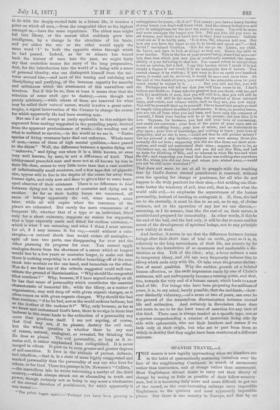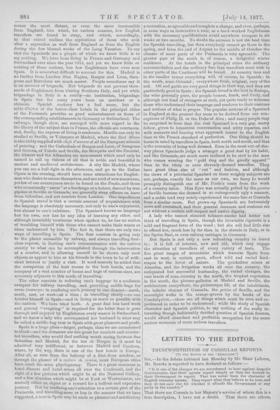SPANISH TRAVEL.—I.
THE season is now rapidly approaching when we islanders are in the habit of systematically scattering ourselves over the face of the neighbouring Continent, in search of amusement rather than instruction, and of change rather than amusement. Most Englishmen abroad desire to carry out their theory of change by seeing as little as possible of their fellow-country- men, but it is becoming daily more and more difficult to get out of the crowd, as the ever-increasing railways carry impossible Englishmen to the quietest and most apparently impossible places. But there is 0110 country in Europe, and that by no means the most distant, or even the most inaccessible from England, into which, for various reasons, few English travellers are found to stray, and which, accordingly, to that extent realises the aspirations of those who seek after a separation as well from England as from the English during the few blessed weeks of the Long Vacation. To say that the Spaniards are a people of which we know little is to say nothing. We have been living in France and Germany and Switzerland ever since the year 1815, and yet we know little or nothing of those nations, but few Englishmen have even seen Spain. It is somewhat difficult to account for this. Madrid is no further from London than Naples, Burgos and Leon, Sara- gossa and Barcelona are much nearer. People sometimes say it is on account of brigands. But brigands do not prevent thou- sands of Englishmen from visiting Southern Italy, and yet while brigandage in Italy is a reality—an institution, brigandage in Spain has for many years been an accident or a chimera. Spanish cookery has a bad name, but the table d'hOtes of the better-class hotels in the principal cities of the Peninsula provides as good entertainment as those of the corresponding establishments in Germany or Switzerland. The railways, though slow, are managed with more regard to the the liberty of the subject than in France, the officials are courteous, and, finally, the expense of living is moderate. Murillo can only be studied at Seville, or Velasquez at Madrid, where the Real Illuseo is also richly supplied with chefs d'oluvres of all the European schools of painting : and the Cathedrals of Burgos and Leon, of Saragossa and Gerona, of Toledo and Seville, the Mezquita and the Escurial, the Alcazar and the Alhambra are monuments which need only be named to call up visions of all that is noble and beautiful in ancient and medival architecture. A city like Madrid, where you can see a bull-fight in the afternoon, and go to the Italian Opera in the evening, should have some attractions for English- men who desire to amuse themeelves, and are avid of new sensations, yet few of our countrymen are to be found on the Prado, and those who occasionally "assist" at a fandango or a bolero, danced by true gipsies at Seville or Granada, are generally stray officers on leave from Gibraltar, and not tourists from London. One impediment to Spanish travel is that a certain amount of acquaintance with the language is absolutely necessary, not only to one's enjoyment, but almost to one's existence. The Spaniard knows no language but his own, nor has he any idea of learning any other, and although invariably courteous when spoken to, he has no notion of troubling himself with those who cannot make their wants or ideas understood by him. The fact is, that there are only two ways of travelling in Spain. The first consists in going only to the places accessible by railway, and always travelling first- class express, in limiting one's communication with the natives strictly to what can be accomplished through the intervention of a courier, and in allowing oneself to be shown only such objects as appear to him or his friends in the town to be of suffi- cient interest to justify a visit. It need scarcely be added that the occupation of the best rooms in the best hotels, and the company of a vast number of boxes and bags of various sizes, are necessary adjuncts to this mode of travelling.
The other consists in reducing one's baggage to a moderate compass for railway travelling, and providing saddle-bags for cross-journeys; in confining one's journey to one district—north, south, east, or west—at a time ; in travelling slowly—no one hurries himself in Spain—and in living as much as possible with the natives. We have tried both. A great deal less hard work and general " roughing " is required for the latter than is gone through and enjoyed by Englishmen every season in Switzerland, and we know a lady who accompanied her husband in what may be called a saddle-bag tour in Spain with great pleasure and profit.
Spain is a large place—larger, perhaps, than we are accustomed to think—and the distances are too great for couriers and courier- led travellers, who would find nothing worth seeing between San Sebastian and Madrid, for the inn at Barges is it must be admitted very indifferent, or between Madrid and Cordova, where, by the way, there is one of the best hotels in Europe. After all, as seen from the balcony of a first-floor -window, or through the glasses of a voiture de remise, most European cities have much the same physiognomy. There is a great sameness in hotel-dinners and hotel-wines all over the Continent, and the sight of a few pictures which might be at the National Gallery, and a few churches which might be at York or 'Westminster, are scarcely either an object or a reward for a tedious and expensive journey. But by confining one's attention to a certain part of the Peninsula, and travelling more or less in the manner that WO have suggested, a tour in Spain may be made as pleasant and satisfactory a recreation, as agreeable and complete a change, and even, perhaps, in some ways as instructive a tour, as a hard-worked Englishman with the necessary qualifications could anywhere eompass in six weeks or two mouths. No doubt the autumn is not tire best time for Spanish travelling, but then everybody cannot go there in the spring, and from the end of August to the middle of October the climate of most parts of the Peninsula is very agreeable. The greater part of the south is, of course, a delightful winter residence. At the hotels in the principal cities the ordinary accommodation and the ordinary fare that travellers meet with in other parts of the Continent will be found. At country inns and in the smaller towns everything will, of course, be Spanish ; in the south, semi-Oriental ; everywhere fresh, original, racy of the soil. Oil and garlic are very good things in their way, and they are particularly good in Spain ; the Spanish bread is the best in Europe, the wine generally pure, the people honest, frank, and lively, and although not fond of strangers as such, yet quite ready to welcome those who understand their language and conform to their customs and notions of what is proper. The popular notions of a Spaniard in England at the present day seem to be derived from our con- ceptions of Philip H. or the D uke' of Alva ; and many people may be surprised to hear that the real Spaniard is a very gay, merry fellow, given to humorous conversation and witty repartee, and with manners and bearing what approach nearer to the English than to the French standard of perfection. One thing should be borne in mind by travellers in Spain, both north and south, and that is the necessity of being well dressed. Even in the most out-of-the- way places Spaniards judge a stranger a good deal by his habit, and like Orientals, are muck more inclined to be civil to the man Who comes wearing the "gold ring and the goodly apparel" than to the vilely or even slovenly-dressed traveller. They have great ideas also of " cut " and fashion, and although the views of a provincial Spaniard on these weighty subjects are not, perhaps, exactly the same as our own, we fancy he would promptly distinguish one of Mr. Poole's coats from the work of a country tailor. Miss Eyre was actually pelted by the gamins of Seville because she dressed in so outrageously ugly a manner, and a noble lord very nearly experienced the same fate at Granada from a similar cause. But grown-up Spaniards are fortunately more self-contained, and their general manners and customs are not without a certain self-respect and native dignity.
A lady who cannot stomach tobacco-smoke had better not think of travelling in Spain, though the invariable cigarette is a mild and fragrant form of the weed ; but she will find little else to offend her, much less by far than in the streets in Italy, or in the Speise Sash, or even railway carriages in Germany.
But Spain is not only a new refreshing country to travel in ; it is full of interest, new and old, which may engage the attention of travellers of every variety of taste. The five great ranges of mountains which traverse Spain from east to west, in certain parts, afford wild and varied land-
scapes to the lover of nature. The quicksilver mines at Almaden, and the irrigation works all over the country, the antiquated but successful husbandry, the varied vintages, the vast tracts of corn-country in the north, the tropical vegetation in the south, the picture-galleries at Madrid and Seville, the architecture everywhere, the picturesque life of the inhabitants, the infinite charms of Granada, the patios of Seville, and the moonlight walks in the orange-groves by the banks of the Guadalquivir,--these are all things which must be seen and ex- perienced in order to be understood ; while the study of Spanish character and Spanish politics, to say nothing of the really in- teresting though fashionably derided question of Spanish finance, would afford abundant and profitable occupation for the more serious moments of more serious travellers.



































 Previous page
Previous page